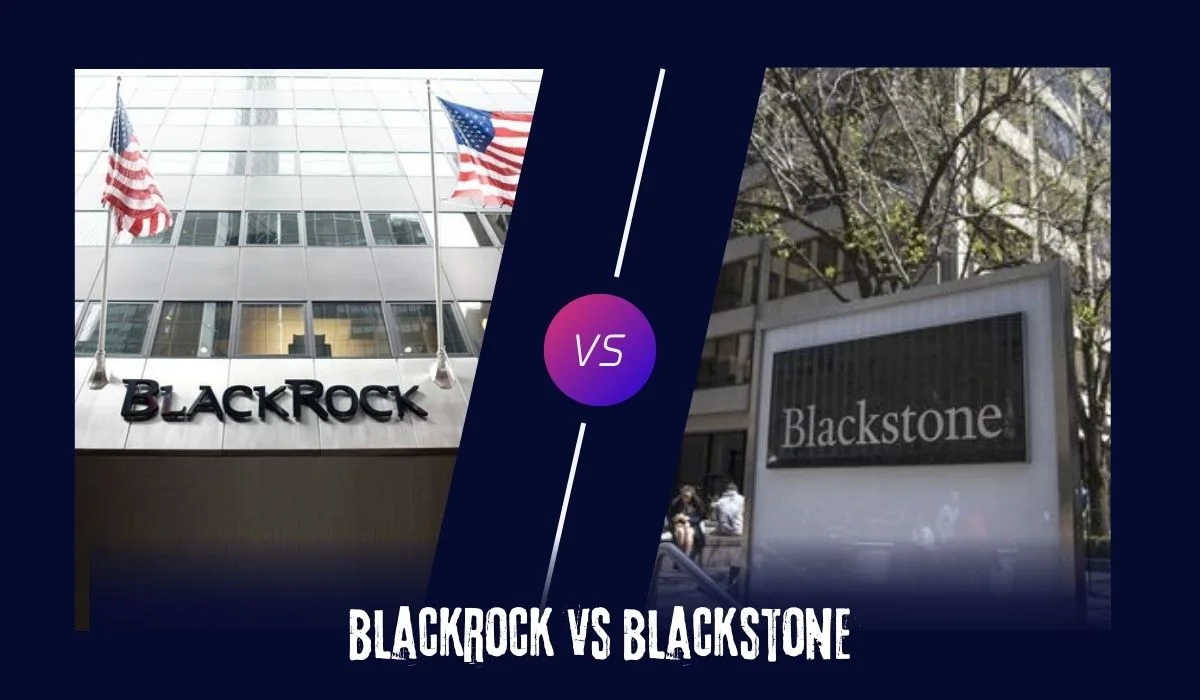In the world of finance, two names dominate the landscape of asset management—BlackRock vs Blackstone. Both firms have gained significant recognition for their enormous influence, but despite their similar names, they operate in different sectors and employ distinct strategies. BlackRock manages a staggering $9 trillion in assets, while Blackstone handles around $1 trillion. This vast difference in scale highlights the nuances between these two financial powerhouses.
This article will explore the key differences between BlackRock vs Blackstone, focusing on their business models, strategies, growth trajectories, and overall market presence. We will also delve into how these two firms shape the investment landscape and what investors should know when choosing between them.
Introduction: BlackRock vs Blackstone
BlackRock vs Blackstone are two of the most prominent names in the finance industry. Although their names may suggest a close relationship, these firms have distinct identities. BlackRock, founded in 1988 by Larry Fink, is the world’s largest asset manager with over $9 trillion in assets under management (AUM). It is primarily known for its work in passive investing and the success of its iShares brand of exchange-traded funds (ETFs).
On the other hand, Blackstone, also established in 1985 by Stephen Schwarzman and Peter Peterson, is the largest private equity firm globally, managing over $1 trillion in alternative investments such as real estate, private equity, and hedge funds. Despite their differing focus areas, both firms have significantly shaped global finance and investing.
The core difference between the two lies in their business models. While BlackRock focuses on managing public market assets like stocks and bonds, Blackstone excels in the private equity sector, with a particular emphasis on alternative investments.
Understanding BlackRock: The Global Asset Management Giant
BlackRock holds the crown as the largest asset manager in the world, overseeing assets totaling over $9 trillion. Its success is driven primarily by its dominant role in passive investing, specifically through ETFs and index funds. The company’s flagship iShares line, which accounts for a considerable portion of its AUM, has revolutionized how investors engage with the stock market.
One key aspect of BlackRock’s strategy is its use of low-cost investing vehicles, such as index funds and ETFs, which have proven popular among institutional and retail investors alike. These products offer broad market exposure with minimal fees, making them attractive to cost-conscious investors.
In addition to passive investing, BlackRock has developed a robust offering in active management, fixed-income products, and sustainable investments, notably in ESG (Environmental, Social, and Governance). BlackRock’s commitment to ESG principles has further cemented its position as a leader in global finance.
Exploring Blackstone: The Private Equity Titan
While BlackRock thrives in the public markets, Blackstone leads the charge in the realm of private equity and alternative investments. With over $1 trillion in AUM, Blackstone is the largest alternative investment firm in the world. Its portfolio includes a diverse range of assets, such as private equity, real estate, infrastructure, credit, and hedge funds.
Blackstone has gained a reputation for acquiring undervalued companies, restructuring them, and later selling them for a profit. Its success in real estate is particularly noteworthy, with the firm holding significant ownership in commercial properties, hotels, and residential developments.
Unlike BlackRock, which caters to a broader market, Blackstone primarily focuses on high-net-worth individuals, institutional investors, and sovereign wealth funds. These clients seek higher returns, often through riskier and more illiquid investments.
Business Models: BlackRock vs Blackstone
The fundamental difference between BlackRock and Blackstone lies in their business models.
- BlackRock specializes in managing public market assets, such as stocks, bonds, and mutual funds. Its business thrives on providing low-cost investment vehicles, including ETFs and index funds, to a broad client base.
- Blackstone operates primarily in the private equity space, targeting alternative assets like real estate, private equity, and credit. Blackstone’s investments are often long-term and illiquid, focused on generating high returns for sophisticated investors.
Strategies for Growth: A Comparative Analysis
BlackRock’s Focus on ETFs and Index Funds
BlackRock’s growth has been heavily fueled by its iShares ETF line, which has become a global leader in the ETF market. The firm’s emphasis on passive investing has aligned well with the broader market trend of investors moving away from actively managed funds. This approach has allowed BlackRock to capture a significant share of assets from institutional investors, pension funds, and retail investors seeking low-cost options.
Blackstone’s Dominance in Alternative Investments
In contrast, Blackstone has built its empire through its focus on alternative investments. While BlackRock caters to a wide variety of investors, Blackstone’s clientele is more exclusive, consisting mainly of institutional investors and high-net-worth individuals. The firm has capitalized on the growing demand for private equity and real estate assets, providing investors with opportunities that often yield higher returns compared to traditional stock and bond markets.
Market Presence and Influence
When it comes to global market presence, both firms have substantial influence but in different areas. BlackRock dominates the public markets with its extensive reach in passive investing. Its iShares ETFs are some of the most traded funds on global stock exchanges.
Meanwhile, Blackstone holds significant sway in the private markets, particularly in real estate, private equity, and credit. The firm’s ability to acquire and develop assets across multiple sectors has made it a pivotal player in the alternative investment space.
Revenue Streams: Where the Money Comes From
BlackRock generates revenue primarily from management fees on its assets under management. Given its scale, even small management fees on trillions of dollars add up to substantial revenues. Its diversification into technology services, such as the Aladdin risk management platform, has also contributed to its bottom line.
On the other hand, Blackstone’s revenue comes from a combination of management fees, performance fees, and carried interest from its private equity investments. The firm benefits from the substantial performance fees generated by its successful investments in private markets.
Innovation and Technological Advancements
In recent years, BlackRock has made significant investments in technology, notably through its Aladdin platform, a risk management and portfolio management system. Aladdin is widely regarded as one of the most advanced investment technology platforms in the industry, providing clients with real-time risk analytics and portfolio management tools.
Blackstone, while not as focused on technology as BlackRock, has embraced innovation in its approach to private equity and real estate investments. The firm utilizes advanced data analytics to identify trends and opportunities, enhancing its decision-making process.
BlackRock vs Blackstone: Clientele and Investor Base
One of the stark contrasts between BlackRock vs Blackstone is the composition of their respective clientele.
- BlackRock serves a broad range of investors, from institutional clients like pension funds and sovereign wealth funds to individual retail investors.
- Blackstone primarily targets institutional investors, private equity clients, and wealthy individuals seeking alternative investment opportunities.
Leadership and Corporate Culture
Leadership plays a crucial role in the success of any company, and both BlackRock and Blackstone are led by industry giants.
- BlackRock is helmed by Larry Fink, a prominent figure in global finance who has been instrumental in BlackRock’s meteoric rise.
- Blackstone is led by Stephen Schwarzman, who has built Blackstone into the largest alternative investment firm in the world through a mix of strategic acquisitions and innovative investment approaches.
Environmental, Social, and Governance (ESG) Initiatives
Both firms have made strides in ESG investing, but BlackRock has been more vocal about its commitment. In recent years, Larry Fink has emphasized the importance of sustainability in investment decisions, encouraging companies to align with ESG principles.
While Blackstone has also embraced ESG initiatives, its approach is more focused on real estate and infrastructure projects that contribute to sustainable development.
Risks and Challenges Faced by BlackRock and Blackstone
Despite their success, both BlackRock and Blackstone face significant risks. BlackRock is vulnerable to market downturns, as its assets are heavily tied to the performance of global stock and bond markets. Additionally, the growing competition in the ETF space could threaten its dominance.
For Blackstone, the illiquid nature of its investments poses a risk. In economic downturns, the firm may struggle to exit investments at favorable terms. Moreover, its reliance on performance fees means its revenue is closely tied to the success of its private equity deals.
Conclusion
The choice between BlackRock vs Blackstone ultimately depends on your investment goals. BlackRock is an excellent option for those seeking broad market exposure through low-cost index funds and ETFs. Its focus on passive investing makes it a strong choice for investors looking for steady, long-term growth with minimal fees.
On the other hand, Blackstone is better suited for sophisticated investors interested in alternative investments like private equity and real estate. While these investments carry more risk, they also offer the potential for higher returns.
FAQs
1. Are BlackRock and Blackstone related?
No, despite their similar names, BlackRock and Blackstone are separate companies with different business models and areas of focus.
2. What is the primary difference between BlackRock and Blackstone?
BlackRock specializes in public market assets, such as ETFs and mutual funds, while Blackstone focuses on alternative investments like private equity and real estate.
3. Which company is larger, BlackRock or Blackstone?
In terms of assets under management (AUM), BlackRock is significantly larger, managing over $9 trillion compared to Blackstone’s $1 trillion.
4. Can retail investors invest in Blackstone?
Retail investors can invest in Blackstone’s publicly traded stock, but its private equity funds are generally limited to institutional and high-net-worth investors.
5. What is BlackRock’s stance on ESG investing?
BlackRock has been a leader in ESG investing, with CEO Larry Fink urging companies to adopt sustainable business practices.





One thought on “BlackRock vs Blackstone : A Detailed Comparison of Giants in Asset Management”